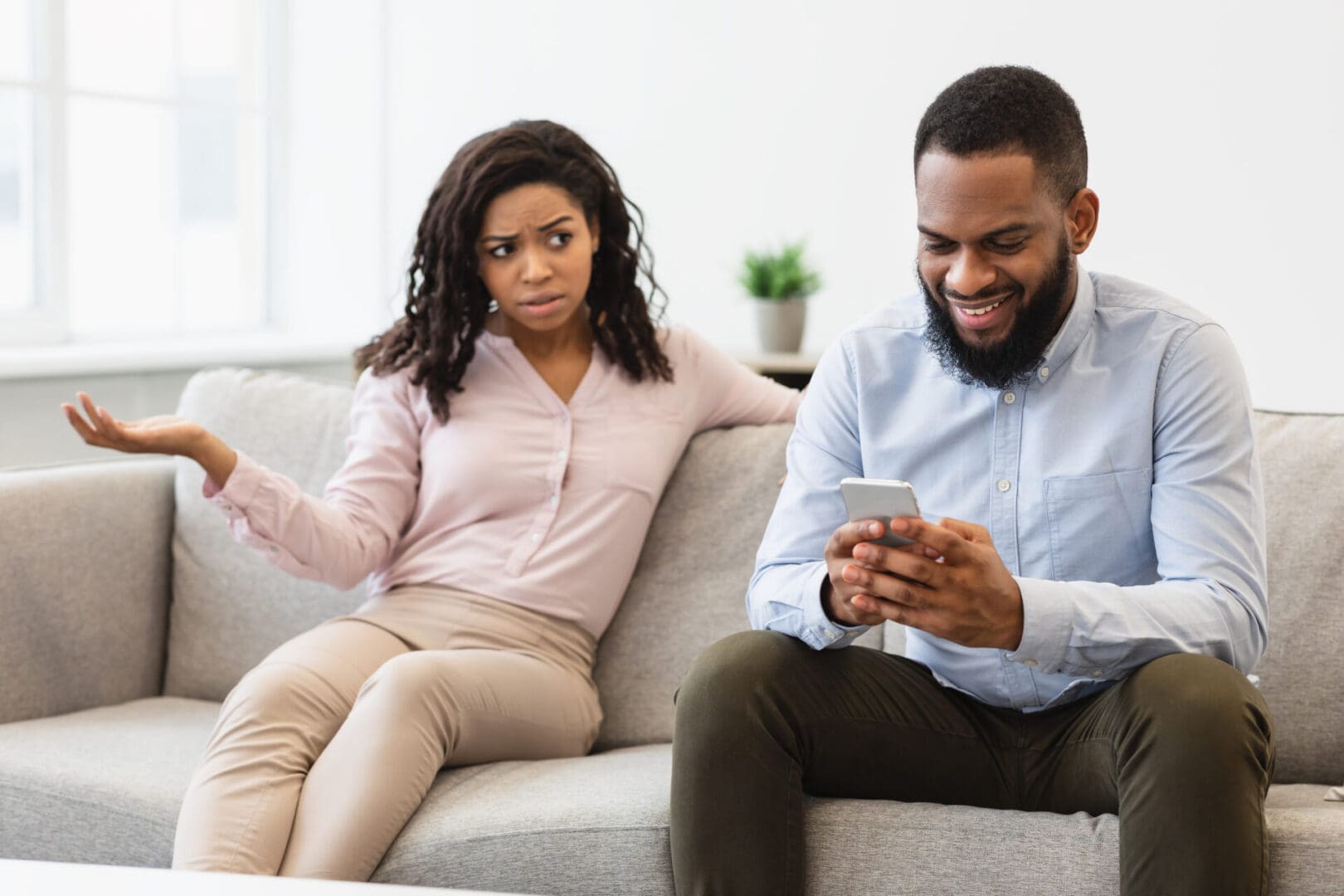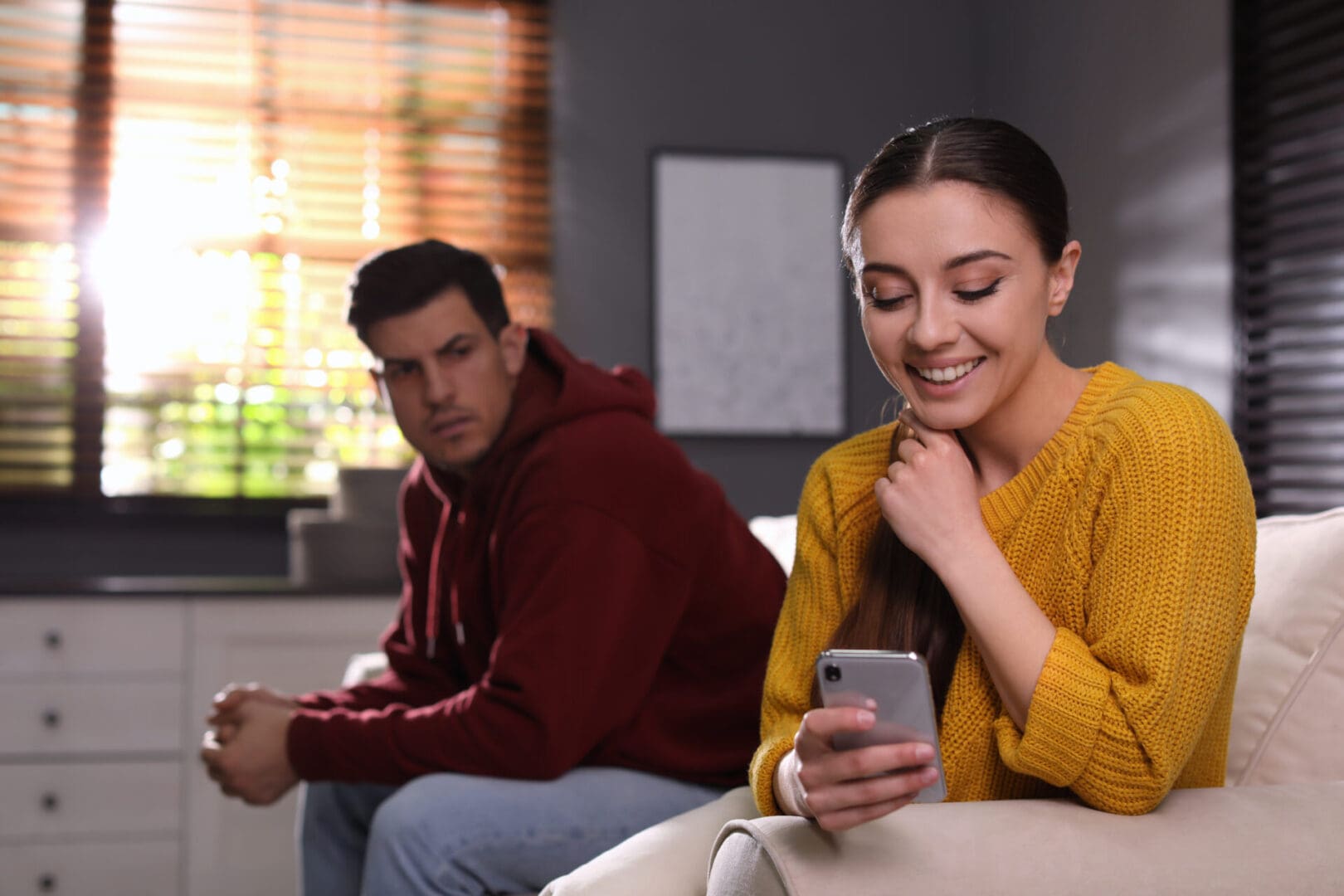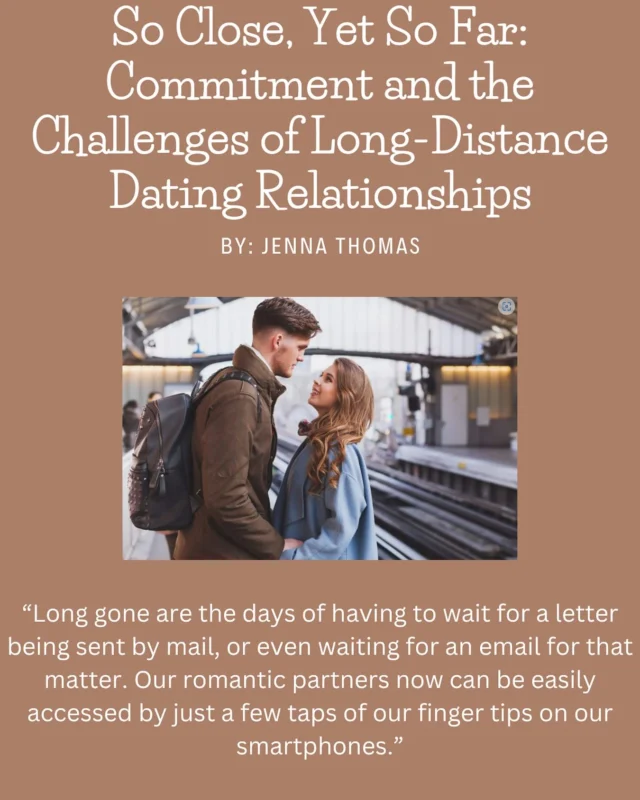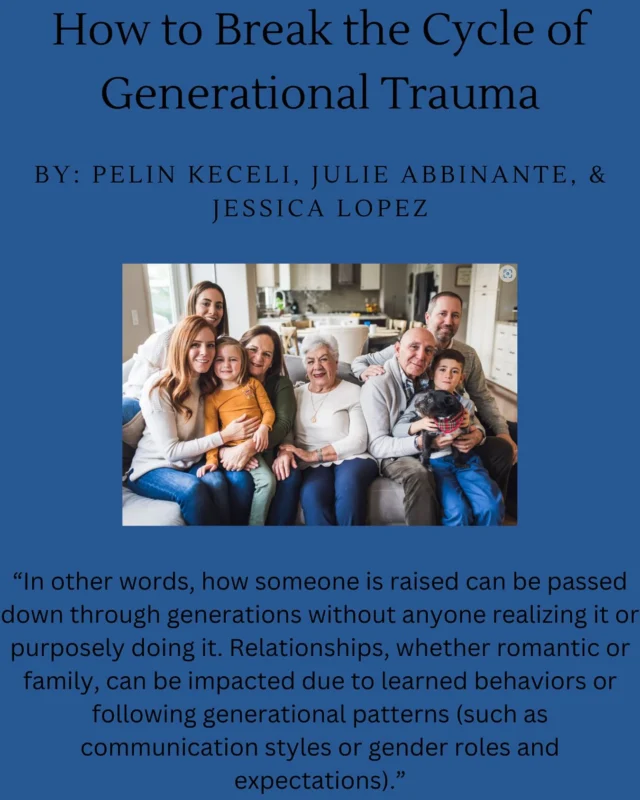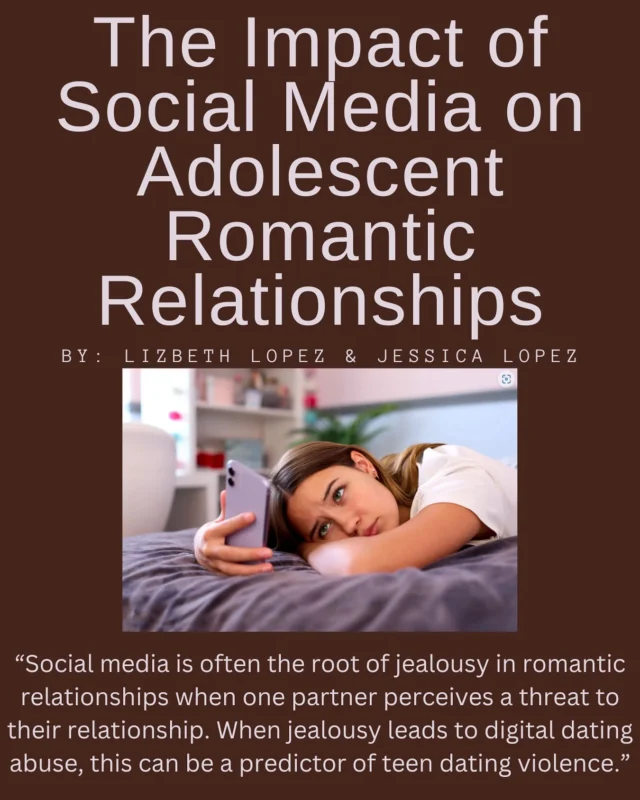Do you ever feel like your significant other is always distracted on their phone? Do you feel ignored by your companion due to their phone usage? If so, your significant other may be “phubbing,” which is ignoring one’s significant other to pay attention to their phone or other devices. Throughout this post, I will be discussing how phones affect our own health, how they affect our romantic relationships and commitment, and how you can put the phone down or help your significant other put their phone down to build a deeper and more resilient relationship.
How Phones Affect Your Own Mental Health
Smartphones have been around since the late 1990s to early 2000s. 95% of young adults have a phone, and 45% say they are constantly on the internet (McDaniel & Drouin 2019). According to the National Library of Medicine, existing research on technology stress and digitalization anxiety claims that these findings show a link between phone usage and increased depression and anxiety rates. This means that increasing phone usage can lead to an increase in depression and anxiety. Using your phone constantly can even lead to a sense of loneliness which recently has been spoken about on the blog and its effect on our relationships.
The way you view your partner when they are on their phone could also be based on your attachment style. We have also talked a lot about attachment styles on our blog, but even when dealing with phubbing, it can make a difference in your romantic relationships. If you have an anxious attachment style, you may have a fear of your partner abandoning you and feel a need for closeness with your partner more than usual, and if you feel as if you have a fear of rejection from your partner, you may have an avoidant attachment to your partner (Zhang et al., 2021). Studies have shown there is a positive correlation between excessive phone usage and attachment anxiety and a weak positive correlation between excessive phone and attachment avoidance (Zhang et al., 2021). This means that if you have an anxious attachment style, you are more likely to also be using your phone excessively.
How Phubbing Can Impact Your Relationships
The term “phubbing,” a mix of the words “phone” and “snubbing,” refers to being ignored by someone using their phone (Roberts & David, 2016). Whether you are being phubbed or doing the phubbing, being ignored in a conversation with your significant other never feels good. Based on previous research, phubbing increases couples’ phone-related conflict, which then decreases relationship satisfaction (McDaniel et al., 2018). Even though you may think sending a text or even glancing at your phone does not affect your relationship with your partner, it does have a negative effect. When being phubbed by your partner, it can really lead to feelings of annoyance and anger. A recent study done on university students shows that 83% of the group studied reported feeling annoyed and 66.5% feeling angry when being phubbed (Thomas, Carnelley & Hart, 2021).
Even though phubbing is a physical action, it can lead to internal damage in your relationships. Recent studies show that even the presence of phones interferes negatively with romantic relationships by not being able to develop a sense of closeness and trust towards one partner (Przybylski, A., Weinstein, N., 2012). Other than leading to a decrease in trust and closeness, phubbing can also lead to decreasing marital satisfaction, which can lead to greater feelings of depression (Seppala, E., 2017). Being a phubber or being phubbed in your romantic relationships overall can cause there to be decreased trust, increased anxiety and depression, and a decrease in overall relationship satisfaction.
Personally, I try my best to always be present in the moment when talking with others, especially if they are important to me. Then again, no one is perfect, and everyone has been a phubber and has phubbed someone else. That said, I would agree that trying to talk with someone on their phone by texting or swiping can make you feel like you are not important and that your partner is not listening to you. In the next part, I will talk about some signs to see if you or your partner are a phubber and how to overcome this adversity.
Are You a Phubber?
As much as we would like to believe only our partners are phubbing, it is possible that you may be a phubber as well. If you feel like you always have your phone in your hand or always feel the need to be swiping, tapping, or texting while going about your day, you may be a phubber.
Here are three signs that you may be a phubber:
- You always seem to ask your significant other to repeat themselves because you were distracted (on your phone). You are not listening to your partner when they are speaking to you hence having to ask them to repeat themselves.
- You bring out your phone immediately in social settings. If you find yourself always looking for your phone or actively looking at your phone in social settings, you may be a phubber. Even though studies show even having your phone out makes those around you feel less connected (Przybylski & Weinstein 2012).
- You find yourself more invested in your online life than in your own real life, especially with your partner. If you feel disconnected from yourself in real life and more invested in your time and social life online, you may be a phubber.
If you or your partner can relate and agree to these three signs of phubbing, it is not the end of the world. Being a phubber or having a phubbing partner does not mean your relationship is doomed. I will now speak of how to overcome phubbing and reconnect stronger with your romantic partner.
How to Overcome “Phubbing” and Excessive Phone Usage in Your Relationship
Now that we have talked about how cell phones can negatively affect you and your romantic relationships, it is beneficial to know how to stop excessive usage of your cell phone and reconnect with your partner. If you are the phubber in your relationship, here are some ways you can overcome your excessive phone usage:
- Make certain times of the day a no phone use time. For example, an hour or two after waking up or an hour or two before bed.
- Only use your phone when needed. For example, this could be personal or work-related calls and or small tasks as such.
- Set goals for yourself. See how long you can go without your phone and see how that makes you feel.
Now, if your partner is the one doing the phubbing, you can always be there to support one another. There are ways to go about helping your partner get off their phones. Some of these ways include:
- Be patient. Acknowledge that your partner is trying and that you two will try to support one another to limit phone time
- Be present. Try to spend more time with your partner and do more activities that do not require you to be on a phone.
- Setting boundaries. Talk with your partner and see how you two can work with the phone usage and try to compromise with one another.
Finally, we encourage you to turn toward your partner instead of away from them, as explained by the work of Drs. John and Julie Gottman. We encourage you to do all that you can each day to connect emotionally with your partner. By learning to break away from your phone and focus on your partner, you can avoid distractions and improve your romantic relationship.
References
- Daniyal, M., Javaid, S. F., Hassan, A., & Khan, M. A. (2022). The Relationship between cellphone usage on the physical and mental wellbeing of university students: A cross-sectional study. International Journal of Environmental Research and Public Health, 19(15), 9352.
- Golem, K. (2021). How your smartphone might sabotage your relationship. The Gottman Institute. Retrieved from: https://www.gottman.com/blog/smartphone-might-sabotage-relationship/
- How mobile devices can interrupt romantic relationships. (2020). Forever Families. Retrieved from: https://foreverfamilies.byu.edu/how-mobile-devices-can-interrupt-romantic-relationships
- McDaniel, B. T., & Drouin, M. (2019). Daily technology interruptions and emotional and relational well-being. Computers in Human Behavior, 99, 1–8.
- McDaniel, B. T., Galovan, A. M., Cravens, J. D., & Drouin, M. (2018). “Technoference” and implications for mothers’ and fathers’ couple and coparenting relationship quality. Computers in Human Behavior, 80, 303–313.
- Pew Research Center, & Schaeffer, K. (2019, August 23). Most U.S. teens who use cellphones do it to pass time, connect with others, learn new things. Pew Research Center. Pew Research Center. Retrieved from: https://www.pewresearch.org/short-reads/2019/08/23/most-u-s-teens-who-use-cellphones-do-it-to-pass-time-connect-with-others-learn-new-things
- Przybylski, A. K., & Weinstein, N. (2012). Can you connect with me now? How the presence of mobile communication technology influences face-to-face conversation quality. Journal of Social and Personal Relationships, 30(3), 237–246.
- Roberts, J. A., & David, M. E. (2016). My life has become a major distraction from my cell phone: Partner phubbing and relationship satisfaction among romantic partners. Computers in Human Behavior, 54, 134–141.
- Seppala, E. (2017, October 10). What is your phone doing to your relationships? Greater Good. Retrieved from: https://greatergood.berkeley.edu/article/item/what_is_your_phone_doing_to_your_relationships
- Teepe, G. W., Glase, E. M., & Reips, U. (2023). Increasing digitalization is associated with anxiety and depression: A Google Ngram analysis. PLOS ONE, 18(4), e0284091.
- Thomas, T. T., Carnelley, K. B., & Hart, C. M. (2022). Phubbing in romantic relationships and retaliation: A daily diary study. Computers in Human Behavior, 137, 107398.
- Thomée, S. (2018). Mobile Phone Use and Mental Health. A review of the research that takes a psychological perspective on exposure. International Journal of Environmental Research and Public Health, 15(12), 2692.
- Zhang, Y., Ding, Y., Huang, H., Peng, Q., Wan, X., Lu, G. L., & Chen, C. (2022). Relationship between insecure attachment and mobile phone addiction: A meta-analysis. Addictive Behaviors, 131, 107317.
Discover more from Decide To Commit
Subscribe to get the latest posts sent to your email.
